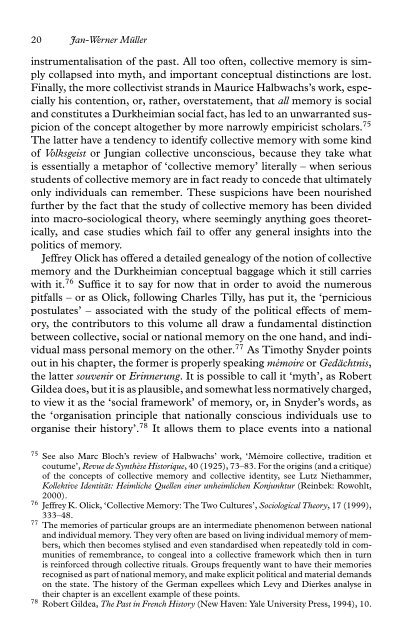Memory and Power in Post-War Europe: Studies in the Presence of ...
Memory and Power in Post-War Europe: Studies in the Presence of ...
Memory and Power in Post-War Europe: Studies in the Presence of ...
You also want an ePaper? Increase the reach of your titles
YUMPU automatically turns print PDFs into web optimized ePapers that Google loves.
20 Jan-Werner Müller<br />
<strong>in</strong>strumentalisation <strong>of</strong> <strong>the</strong> past. All too <strong>of</strong>ten, collective memory is simply<br />
collapsed <strong>in</strong>to myth, <strong>and</strong> important conceptual dist<strong>in</strong>ctions are lost.<br />
F<strong>in</strong>ally, <strong>the</strong> more collectivist str<strong>and</strong>s <strong>in</strong> Maurice Halbwachs’s work, especially<br />
his contention, or, ra<strong>the</strong>r, overstatement, that all memory is social<br />
<strong>and</strong> constitutes a Durkheimian social fact, has led to an unwarranted suspicion<br />
<strong>of</strong> <strong>the</strong> concept altoge<strong>the</strong>r by more narrowly empiricist scholars. 75<br />
The latter have a tendency to identify collective memory with some k<strong>in</strong>d<br />
<strong>of</strong> Volksgeist or Jungian collective unconscious, because <strong>the</strong>y take what<br />
is essentially a metaphor <strong>of</strong> ‘collective memory’ literally – when serious<br />
students <strong>of</strong> collective memory are <strong>in</strong> fact ready to concede that ultimately<br />
only <strong>in</strong>dividuals can remember. These suspicions have been nourished<br />
fur<strong>the</strong>r by <strong>the</strong> fact that <strong>the</strong> study <strong>of</strong> collective memory has been divided<br />
<strong>in</strong>to macro-sociological <strong>the</strong>ory, where seem<strong>in</strong>gly anyth<strong>in</strong>g goes <strong>the</strong>oretically,<br />
<strong>and</strong> case studies which fail to <strong>of</strong>fer any general <strong>in</strong>sights <strong>in</strong>to <strong>the</strong><br />
politics <strong>of</strong> memory.<br />
Jeffrey Olick has <strong>of</strong>fered a detailed genealogy <strong>of</strong> <strong>the</strong> notion <strong>of</strong> collective<br />
memory <strong>and</strong> <strong>the</strong> Durkheimian conceptual baggage which it still carries<br />
with it. 76 Suffice it to say for now that <strong>in</strong> order to avoid <strong>the</strong> numerous<br />
pitfalls – or as Olick, follow<strong>in</strong>g Charles Tilly, has put it, <strong>the</strong> ‘pernicious<br />
postulates’ – associated with <strong>the</strong> study <strong>of</strong> <strong>the</strong> political effects <strong>of</strong> memory,<br />
<strong>the</strong> contributors to this volume all draw a fundamental dist<strong>in</strong>ction<br />
between collective, social or national memory on <strong>the</strong> one h<strong>and</strong>, <strong>and</strong> <strong>in</strong>dividual<br />
mass personal memory on <strong>the</strong> o<strong>the</strong>r. 77 As Timothy Snyder po<strong>in</strong>ts<br />
out <strong>in</strong> his chapter, <strong>the</strong> former is properly speak<strong>in</strong>g mémoire or Gedächtnis,<br />
<strong>the</strong> latter souvenir or Er<strong>in</strong>nerung. It is possible to call it ‘myth’, as Robert<br />
Gildea does, but it is as plausible, <strong>and</strong> somewhat less normatively charged,<br />
to view it as <strong>the</strong> ‘social framework’ <strong>of</strong> memory, or, <strong>in</strong> Snyder’s words, as<br />
<strong>the</strong> ‘organisation pr<strong>in</strong>ciple that nationally conscious <strong>in</strong>dividuals use to<br />
organise <strong>the</strong>ir history’. 78 It allows <strong>the</strong>m to place events <strong>in</strong>to a national<br />
75 See also Marc Bloch’s review <strong>of</strong> Halbwachs’ work, ‘Mémoire collective, tradition et<br />
coutume’, Revue de Synthèse Historique, 40 (1925), 73–83. For <strong>the</strong> orig<strong>in</strong>s (<strong>and</strong> a critique)<br />
<strong>of</strong> <strong>the</strong> concepts <strong>of</strong> collective memory <strong>and</strong> collective identity, see Lutz Niethammer,<br />
Kollektive Identität: Heimliche Quellen e<strong>in</strong>er unheimlichen Konjunktur (Re<strong>in</strong>bek: Rowohlt,<br />
2000).<br />
76 Jeffrey K. Olick, ‘Collective <strong>Memory</strong>: The Two Cultures’, Sociological Theory, 17 (1999),<br />
333–48.<br />
77 The memories <strong>of</strong> particular groups are an <strong>in</strong>termediate phenomenon between national<br />
<strong>and</strong> <strong>in</strong>dividual memory. They very <strong>of</strong>ten are based on liv<strong>in</strong>g <strong>in</strong>dividual memory <strong>of</strong> members,<br />
which <strong>the</strong>n becomes stylised <strong>and</strong> even st<strong>and</strong>ardised when repeatedly told <strong>in</strong> communities<br />
<strong>of</strong> remembrance, to congeal <strong>in</strong>to a collective framework which <strong>the</strong>n <strong>in</strong> turn<br />
is re<strong>in</strong>forced through collective rituals. Groups frequently want to have <strong>the</strong>ir memories<br />
recognised as part <strong>of</strong> national memory, <strong>and</strong> make explicit political <strong>and</strong> material dem<strong>and</strong>s<br />
on <strong>the</strong> state. The history <strong>of</strong> <strong>the</strong> German expellees which Levy <strong>and</strong> Dierkes analyse <strong>in</strong><br />
<strong>the</strong>ir chapter is an excellent example <strong>of</strong> <strong>the</strong>se po<strong>in</strong>ts.<br />
78 Robert Gildea, The Past <strong>in</strong> French History (New Haven: Yale University Press, 1994), 10.
















